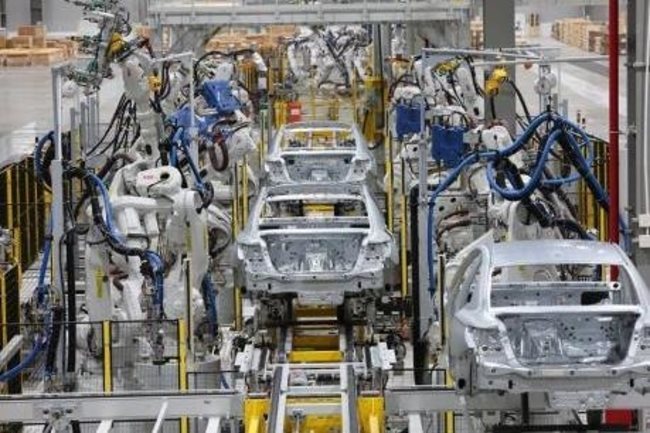 |
|
An automobile manufacturing line run by Vietnamese automaker VinFast, a subsidiary of leading private firm Vingroup. The local market share of cars with fewer than nine seats remains at a modest level of 7% to 10%
|
The ministry said in a report to the National Assembly that in terms of cars with nine seats or below, the localization rate of 7%-10% was far below the target for 2010 of 40%-60%.
Locally produced vehicles use simple domestic parts such as tires, seats, mirrors, glass and batteries, which do not require high tech.
Moreover, a staggering 80%-90% of the main materials used in the production of car parts, such as alloyed steel, aluminum alloys, plastic beads and high-tech rubber, are imported.
As a result, domestic automobile makers annually spend US$2 billion to US$3.5 billion importing components and parts for the production, assembly and repair of vehicles.
Meanwhile, the localization rate of regional countries has reached 65%-70%, and even 80% in Thailand. The ministry said that if manufacturers in the country do not present effective solutions to increase local content soon, they will find it challenging to compete with regional rivals.
The local automobile industry is currently involved in the low-end segment of the automotive value chain, which is heavily reliant on production from global automobile corporations.
The ministry also pointed out that local automobile producers have yet to have technologies for engines and control and transmission systems.
Moreover, the local industry has not met its own criteria. For instance, there is no collaboration between stakeholders in vehicle manufacturing and assembly or auto parts production.
Meanwhile, a large network of material suppliers and parts producers has not yet been set up.
This is why the selling prices of cars in Vietnam are much higher than those in other regional countries. The quality of locally made and assembled cars has shown little improvement.
In the past two years, a number of Vietnamese car models have been exported to Laos, Cambodia, Malaysia and the Central American market.
Data from the Vietnam Register showed that local automakers turned out or assembled more than 258,000 vehicles last year, and the figure in the first half of this year was over 131,000 units.
More than 40 automobile producers and assemblers operate in the country, and they have a combined capacity of some 680,000 vehicles per year.
Nguyen Trung Hieu, head of the Policy Department at the Vietnam Automobile Manufacturers Association, told a conference in Hanoi last week that local enterprises in supporting industries have strong capacity in some areas, such as molds, bicycle and motorbike components and standard mechanical components.
“The automobile industry is about 20 years behind countries in the region, such as Thailand and Indonesia, so there should be special policies to encourage businesses to make breakthroughs,” Hieu was quoted by the Vietnam News Agency as saying.
It is necessary to focus on studying and planning policies to assist businesses, according to Nguyen Thi Hai Binh, an expert from the Institute of Financial Strategy and Policy, with the Ministry of Finance.
She suggested exempting domestically produced goods from special consumption tax, in addition to providing incentives in terms of land and credit for developing automobile manufacturing complexes. SGT
Lan Nhi

Vietnamese automobile manufacturers focus on importing cars, neglect production
In the first half of the year, the number of cars imported to Vietnam increased by 500 percent, while some models saw a sharp increase of 650 percent compared with the same period last year.

Vietnamese automobile industry needs special policies to raise competition
Vietnam needs to issue special policies for the automobile industry to catch up with other countries in the ASEAN region, said experts at a conference held in Hanoi on Tuesday.
 The automobile manufacturing and assembly industry has grown significantly over the past two years, but the ratio of local content in domestically assembled cars with up to nine seats is very low, ranging from 7% to 10%.
The automobile manufacturing and assembly industry has grown significantly over the past two years, but the ratio of local content in domestically assembled cars with up to nine seats is very low, ranging from 7% to 10%.